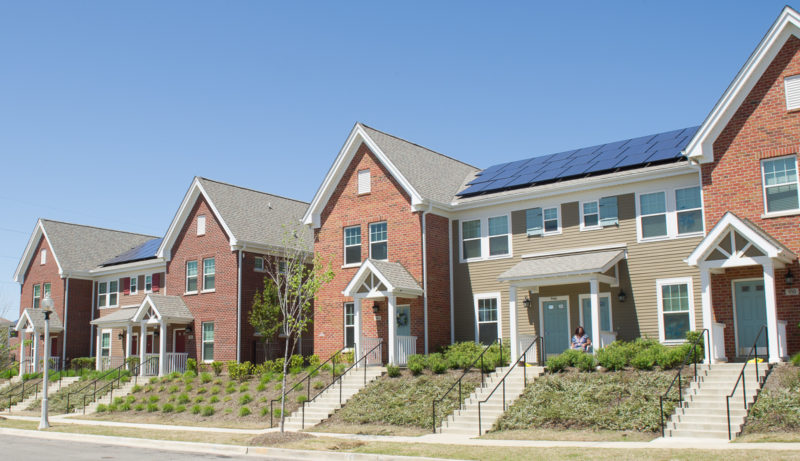More Americans than ever are priced out of the housing market and President Biden has outlined steps his administration is taking to increase development of affordable housing.
In the 2024 Economic Report of the President, President Biden said housing shortages and unaffordability have risen dramatically over the past 60 years, primarily affecting low- and middle-income families. The President mostly blames the nation’s affordable housing shortage on state and local zoning laws, but acknowledges the federal government can offer incentives, loans, downpayment assistance, tax credits and other benefits to spur development and alleviate the crisis.
“A central goal of the Biden-Harris Administration is an economy in which every American has access to a safe and affordable home,” he wrote in the report.
His agenda of budget and policy proposals aimed at increasing affordable housing includes:
Zoning Reform to Increase Affordable Housing
President Biden believes federal dollars can create incentives for states and local municipalities to meet affordable housing goals. He points to several of his administration’s policies designed to incentivize affordable housing:
- The Department of Housing and Urban Development’s (HUD) Pathways to Removing Obstacles to Housing is awarding $85 million in competitive grants to communities with plans to remove barriers to affordable housing in 2024.
- HUD also recently announced $4 million in grant funding to study zoning and land-use reforms, and a $350,000 grant through the Research Partnerships program to support the development of the “National Zoning Atlas” that will “close data gaps that limit our understanding of the relationship between zoning and segregation, affordability, and other outcomes of interest.”
- HUD will also require recipients of its funding to work to overcome patterns of segregation, promote fair housing choice, eliminate disparities in opportunities, and foster inclusive communities free from discrimination.
- The President plans to set aside $20 billion to award planning and housing capital grants to state and local jurisdictions to expand the housing supply.
- The U.S. Department of Transportation manages several large grant programs to improve connections to affordable housing and funding for land-use reform. For example, the Reconnecting Communities and Neighborhoods Program offers funding “for capital construction, community planning, and regional partnerships that prioritize disadvantaged communities, improve access to daily needs, foster equitable development, and reconnect communities.” The Areas of Persistent Poverty Program awards money for projects that “improve transit facilities, technologies, and transit service in areas of persistent poverty or in historically disadvantaged communities.”
- The Economic Development Administration is emphasizing efficient land use with programs such the Housing Supply Action Plan, which provides incentives for local zoning reforms by tying these reforms to federal grant process scoring.
Including Direct Subsidies to Cost-burdened Households
The President wants federal policies that help families close the gap between income and housing costs, through either direct financial assistance or policies that decrease housing costs. He called out several assistance programs that do that, including Project-Based Rental Assistance, Public Housing, and the Section 8 Housing Choice Voucher Program.
President Biden’s Fiscal Year 2024 Budget proposed calls for $2.4 billion in additional voucher funding to expand rental assistance to well over 200,000 additional households. He’s also called for $22 billion in mandatory funding to provide guaranteed housing to extremely low-income veterans and youth transitioning out of foster care.
The plan also calls for the Housing Direct Loan Program to provide $1.3 billion in mortgage relief for low-income families facing credit constraints, and the USDA to provide $13.1 billion in mortgage loan guarantees to help moderate- to low-income rural residents.
Reducing Supply Constraints with Federal Taxes and Other Subsidies
Biden is calling for a series of new short- and long-term policies designed to lower costs for homeowners and homebuyers:
- A temporary mortgage payment relief tax credit for first-time homebuyers
- Down-payment assistance to first-generation homebuyers
- A temporary tax credit targeting low- and middle-income homeowners who sell their starter homes
- New funding to subsidize rehabilitation expenses to reduce the gap between rehabilitation costs and postconstruction home values for single-family homes in distressed neighborhoods
- Tax code relief that directly reduces the cost of building affordable housing by subsidizing construction expenses
- $30 billion to expand and enhance the Low-Income Housing Tax Credit construction subsidy, which has funded one in five of all new multifamily units since 1987 and has created more than 3.5 million affordable rental units
Expanding Manufactured Home Delivery and Financing in Rural Areas
Manufactured housing costs 45 percent less to build than site-built housing, possibly providing affordable housing units and alleviating supply constraints. However, expanding the manufactured housing supply often runs afoul of land-use regulations, and traditional government mortgage programs such as Fannie Mae and Freddie Mac cannot offer loans for manufactured homes because the owners will not own the land on which the homes sit. Instead, owners must take out “chattel loans” with higher interest rates, shorter repayment periods, and fewer protections.
President Biden wants federal incentives to encourage improved state and local zoning policies for manufactured homes, and he pointed out that Fannie Mae and Freddie Mac “have identified the financing of manufactured and rural housing among the activities targeted by their 2022–24 Duty to Serve Plans, including the plan to begin purchasing loans titled as personal property in 2024 and to increase the purchase of loans titled as real property.”
The President said the persistent failure to create sufficient affordable housing has created a role for government.
“Fortunately, local, State, and Federal policies can boost the housing supply through incentivized changes to zoning policies, tax credits that subsidize construction costs for affordable units, and other block grants that prioritize affordable unit construction,” he wrote.
Harris Beach’s New York Real Estate Developers and Affordable Housing teams are closely following these programs and proposals.
Source: jdsupra.com













